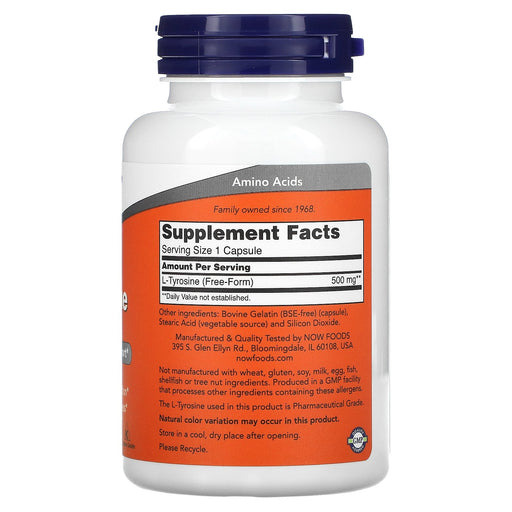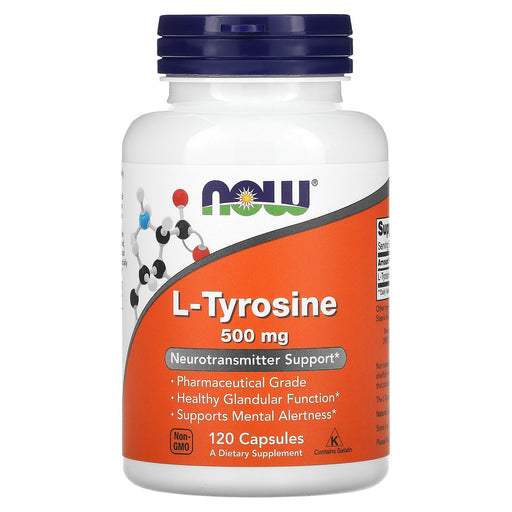
Maximize Your Mental Performance with L-Tyrosine: The Amino Acid for Cognitive Function and Stress Resilience
L-Tyrosine is a non-essential amino acid that serves as a precursor to several important neurotransmitters, including dopamine, norepinephrine, and epinephrine. These neurotransmitters play crucial roles in regulating mood, motivation, focus, and the body's stress response. By supporting the production of these key brain chemicals, L-Tyrosine can help to enhance cognitive function, improve mental clarity and focus, and promote stress resilience in challenging situations. By incorporating L-Tyrosine supplements into your wellness routine, you can optimize your brain's performance and maintain peak mental acuity, even under pressure.
The Neurotransmitter Connection: How L-Tyrosine Supports Cognitive Function and Stress Response
L-Tyrosine's powerful effects on mental performance and stress resilience can be attributed to its role as a precursor to several key neurotransmitters:
- Dopamine Synthesis: L-Tyrosine is converted into L-DOPA and then into dopamine, a neurotransmitter involved in motivation, reward, and pleasure, as well as motor control and cognitive function.
- Norepinephrine and Epinephrine Production: Dopamine is further converted into norepinephrine and epinephrine, two neurotransmitters that play essential roles in the body's stress response, helping to regulate alertness, focus, and energy levels during challenging situations.
- Cognitive Enhancement: By supporting the production of these key neurotransmitters, L-Tyrosine can help to improve cognitive function, mental clarity, and focus, particularly in situations that require sustained attention and mental effort.
- Stress Resilience: Adequate levels of norepinephrine and epinephrine are essential for maintaining optimal cognitive performance and emotional stability under stress, and L-Tyrosine's ability to support their production can help to promote stress resilience and mental toughness.
- Mood Support: Dopamine and norepinephrine also play important roles in regulating mood and emotional well-being, and L-Tyrosine supplementation may help to support a positive mood and reduce symptoms of anxiety and depression.
The Health Benefits of L-Tyrosine Supplementation
Supplementing with L-Tyrosine can offer a wide range of potential health benefits, supporting various aspects of cognitive function, mental well-being, and overall performance. Some of the key benefits of L-Tyrosine include:
- Enhanced Cognitive Performance: By supporting the production of dopamine and other key neurotransmitters, L-Tyrosine can help to improve focus, attention, memory, and overall cognitive function, particularly in challenging or mentally demanding situations.
- Improved Stress Resilience: L-Tyrosine's role in supporting norepinephrine and epinephrine production can help to promote stress resilience, allowing individuals to maintain optimal cognitive performance and emotional stability under pressure.
- Mood Support: By promoting the synthesis of dopamine and norepinephrine, L-Tyrosine may help to elevate mood, reduce symptoms of anxiety and depression, and support overall emotional well-being.
- Fatigue Reduction: L-Tyrosine has been shown to help reduce mental fatigue and maintain cognitive performance during prolonged periods of mental exertion or sleep deprivation.
- Athletic Performance: Some studies suggest that L-Tyrosine supplementation may help to improve physical performance, reduce perceived exertion, and enhance endurance in athletes and fitness enthusiasts.
Choosing the Right L-Tyrosine Supplement
When selecting an L-Tyrosine supplement, it's essential to choose a high-quality product from a reputable brand. Look for supplements that:
- Provide pure, free-form L-Tyrosine in a dosage that aligns with your individual needs and goals, typically ranging from 500mg to 2000mg per day
- Are manufactured in cGMP-certified facilities to ensure purity, potency, and safety
- Are free from unnecessary additives, fillers, and allergens
- Offer convenient dosage forms, such as capsules or powders, to suit your preferences and lifestyle
As with any new supplement, it's essential to consult with a healthcare professional before starting L-Tyrosine, especially if you have a pre-existing health condition, are taking medications, or have a history of thyroid disorders.
Related Vitamins and Supplements
While L-Tyrosine is a powerful amino acid on its own, certain vitamins and supplements can complement its benefits and support overall health. Some relevant options to consider alongside L-Tyrosine include:
- Vitamin B6: This essential vitamin is a cofactor in the conversion of L-Tyrosine to dopamine, and adequate B6 levels are necessary for optimal neurotransmitter production and cognitive function.
- Rhodiola Rosea: This adaptogenic herb helps to reduce stress, improve mental performance, and combat fatigue, working synergistically with L-Tyrosine to promote stress resilience and cognitive function.
- Omega-3 Fatty Acids: These anti-inflammatory fats support brain health, neurotransmitter function, and overall cognitive performance, complementing the nootropic benefits of L-Tyrosine.
- Acetyl-L-Carnitine: This amino acid derivative supports energy production, brain function, and neuroprotection, making it a valuable addition to an L-Tyrosine supplementation regimen for optimal mental performance.
Experience the Cognitive-Enhancing Power of L-Tyrosine
At Health Orchard, we are dedicated to providing our customers with the highest quality L-Tyrosine supplements to support cognitive function, stress resilience, and overall mental performance. Our carefully curated selection features L-Tyrosine products from trusted brands, formulated with pure, bioavailable ingredients for optimal efficacy and safety.
Whether you're looking to enhance focus and concentration, improve stress resilience, elevate mood, or simply optimize your brain's performance under pressure, our L-Tyrosine supplement collection has the perfect product to meet your needs.
Witness the essential role of L-Tyrosine in supporting neurotransmitter production and experience the difference it can make in your journey towards peak mental performance and cognitive well-being. Browse our selection today and take the first step towards unleashing your brain's full potential with this powerful amino acid.
Frequently Asked Questions about L-Tyrosine
1. What is L-Tyrosine used for?
L-Tyrosine is an amino acid commonly used for the following purposes:
- Enhancing cognitive function, particularly under stress or sleep deprivation
- Improving mood and reducing symptoms of depression and anxiety
- Supporting thyroid function and hormone production
- Improving alertness and reducing fatigue
- Enhancing exercise performance and endurance
- Supporting healthy blood pressure levels
L-Tyrosine is also used in medical settings to treat certain conditions, such as phenylketonuria (PKU) and tyrosine deficiency.
2. Is it safe to take L-Tyrosine everyday?
For most people, taking L-Tyrosine daily in recommended doses is generally considered safe. The typical daily dose ranges from 500-2,000 mg, depending on individual needs and goals. However, long-term use of high doses may cause side effects in some people, such as:
- Headaches
- Insomnia
- Irritability
- Digestive discomfort (nausea, stomach pain)
- Heart palpitations
It's essential to consult a healthcare professional before taking L-Tyrosine daily, especially if you have pre-existing health conditions or are taking medications. Some individuals, such as pregnant or breastfeeding women and people with hyperthyroidism or Graves' disease, should avoid L-Tyrosine supplements unless directed by a healthcare provider.
3. Is L-Tyrosine good for anxiety?
L-Tyrosine may be beneficial for reducing anxiety, particularly when stress is a contributing factor. As a precursor to neurotransmitters like dopamine and norepinephrine, L-Tyrosine supplementation may help:
- Improve mood and reduce feelings of anxiety and depression
- Enhance cognitive function and mental clarity under stress
- Promote a sense of calm and well-being
- Support the body's stress response and adaptation to stressful situations
However, individual responses to L-Tyrosine for anxiety can vary, and it should not be used as a substitute for professional medical advice or treatment for anxiety disorders. If you are considering using L-Tyrosine for anxiety, it's essential to consult a healthcare professional to determine if it is appropriate for your individual needs and to establish a safe and effective dosage.
4. Does L-Tyrosine give you energy?
L-Tyrosine may help improve energy levels and reduce fatigue, particularly under stress or sleep deprivation. This is because L-Tyrosine is a precursor to neurotransmitters like dopamine and norepinephrine, which play a crucial role in regulating energy, alertness, and motivation. By supporting the production of these neurotransmitters, L-Tyrosine supplementation may help:
- Improve mental and physical energy levels
- Reduce feelings of fatigue and exhaustion
- Enhance cognitive function and mental clarity
- Support exercise performance and endurance
However, the energy-boosting effects of L-Tyrosine may be more subtle compared to stimulants like caffeine, and individual responses can vary. If you are considering using L-Tyrosine for energy, it's best to consult a healthcare professional to determine if it is appropriate for your individual needs and to establish a safe and effective dosage.
5. Does L-Tyrosine help you sleep?
L-Tyrosine is not typically used as a sleep aid and may not directly help with sleep. In fact, taking L-Tyrosine close to bedtime may actually interfere with sleep due to its potential effects on neurotransmitter production and mental alertness. L-Tyrosine is more commonly used to improve cognitive function, mood, and energy levels during the day, particularly under stress or sleep deprivation. If you are looking for a natural sleep aid, other supplements like melatonin, valerian root, or magnesium may be more appropriate. However, if you are considering using any supplement for sleep, it's essential to consult a healthcare professional to determine if it is safe and appropriate for your individual needs.
6. Should I take Tyrosine day or night?
It is generally recommended to take L-Tyrosine during the day, preferably in the morning or early afternoon. This is because L-Tyrosine may have a stimulating effect on the brain and can potentially interfere with sleep if taken too close to bedtime. By taking L-Tyrosine earlier in the day, you can benefit from its potential cognitive-enhancing, mood-boosting, and energy-supporting effects without disrupting your sleep-wake cycle. However, individual responses to L-Tyrosine can vary, and some people may be more sensitive to its effects than others. If you find that taking L-Tyrosine later in the day causes sleep disturbances, it's best to adjust your timing or consult a healthcare professional for personalized advice.
7. What is the best time to take L-Tyrosine?
The best time to take L-Tyrosine can depend on your individual needs and goals, but in general, it is recommended to take it in the morning or early afternoon. This timing allows you to benefit from L-Tyrosine's potential cognitive-enhancing, mood-boosting, and energy-supporting effects throughout the day without interfering with sleep. Some specific guidelines include:
- For cognitive support: Take L-Tyrosine 30-60 minutes before mentally demanding tasks or stressful situations
- For mood support: Take L-Tyrosine in the morning or early afternoon, preferably on an empty stomach
- For exercise performance: Take L-Tyrosine 30-60 minutes before physical activity or workouts
It's essential to follow the recommended dosage instructions and not exceed the suggested intake. If you are unsure about the best timing or dosage for your needs, consult a healthcare professional for personalized advice.
8. Who should not take Tyrosine?
While L-Tyrosine is generally safe for most people when taken in recommended doses, certain individuals should avoid or use caution when taking L-Tyrosine supplements, including:
- Pregnant or breastfeeding women (due to limited safety data)
- People with hyperthyroidism or Graves' disease (as L-Tyrosine may worsen symptoms)
- Individuals with high blood pressure or heart conditions (as L-Tyrosine may increase blood pressure in some cases)
- Those taking certain medications, such as Monoamine Oxidase Inhibitors (MAOIs), thyroid medications, or Levodopa (as L-Tyrosine may interact with these medications)
If you have any pre-existing health conditions or are taking medications, it's essential to consult a healthcare professional before starting L-Tyrosine supplementation. They can help you determine if L-Tyrosine is appropriate for your individual needs and monitor your response to the supplement.










